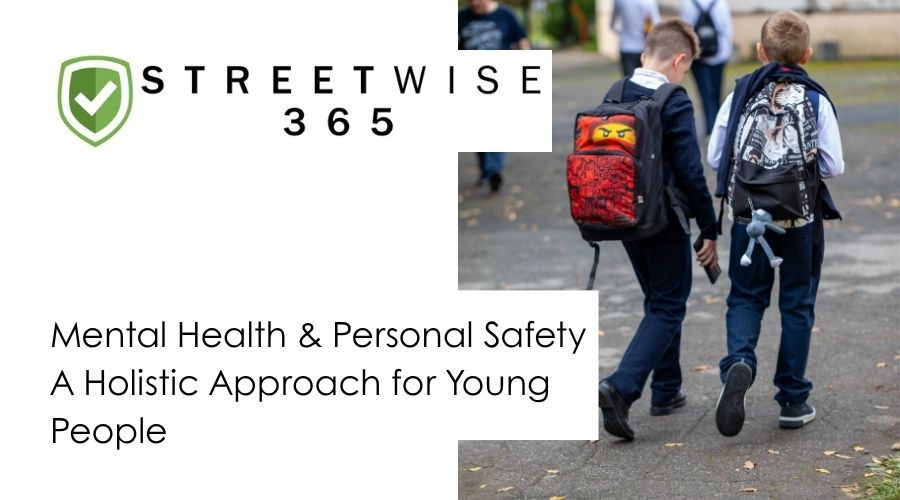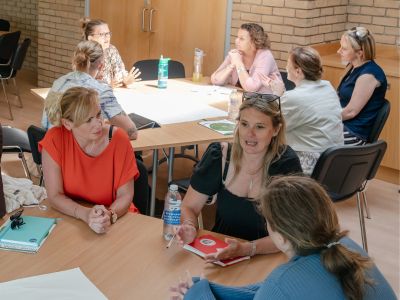
Mental Health & Personal Safety:
A Holistic Approach for Young People
The mental health of young people is under increasing pressure, prompting educators and parents to seek practical ways to build resilience, confidence, and emotional wellbeing.
One often-overlooked but highly effective solution is that of personal safety education — not just for protection, but as a tool for developing emotional strength.
Fear of Crime: A Hidden Mental Health Trigger
The link between personal safety and mental health may not seem obvious at first, but data from the Good Childhood Report, makes it crystal clear. The report states that the biggest fear among young people growing up is not academic failure, bullying, or social pressure—it’s crime. 2.2 million children fear crime over every other worry. A staggering 1 in 4 boys reported fear of being assaulted, while 1 in 3 girls expressed a fear of being followed by a stranger.
This constant sense of vulnerability erodes confidence and contributes to anxiety, withdrawal, and a diminished sense of control.
Empowerment Through Competence
Fear, when left unaddressed, can erode a child’s mental health over time. It chips away at their sense of control and self-worth, leaving them anxious, hyper-vigilant, or withdrawn.
Programs focused on real-world safety skills help reverse this trend by:
- Teaching awareness, de-escalation, and critical thinking.
- Encouraging students to respond to fear with competence, not avoidance.
The result? Young people feel more capable, calm, and in control of their environment.
Grounded in Behavioural Science
A behavioural, science based approach empowers students to recognise and respond to danger intuitively and intelligently. By incorporating concepts such as the body’s natural startle-flinch response and situational awareness, students learn to manage fear instead of being paralyzed by it.
Programs using this approach often draw from behavioural science-based systems by emphasizing:
- The body’s natural startle-flinch response
- Tools for recognizing and reacting to danger intuitively
- Situational awareness and psychological preparedness
From Fear to Identity
More importantly, this education doesn’t just teach students what to do—it teaches them who they are. Through role-play scenarios, guided reflection, and personal coaching, students begin to internalize a mindset of preparedness and calm under pressure.
Beyond physical techniques, students need to engage in:
- Role-playing scenarios
- Self-reflection
- Coaching that develops inner confidence
They begin to internalize a mindset of resilience and self-trust — not just surviving tough moments but knowing they can handle them in advance.
Tangible Outcomes in Schools
Schools that implement programs focusing on safety skills report noticeable changes in student confidence, behaviour and engagement. Students become more present in class, more self-assured in social interactions, and more capable of resolving conflicts peacefully. The ripple effect on their mental health is significant. They no longer carry the same burden of fear—they carry the knowledge that they are prepared, capable, and supported.
Safety-based curriculum is proven to offer:
- Increased student confidence and emotional stability
- Better engagement in class and social situations
- Improved ability to resolve conflict peacefully
The shift in mental health is clear: students replace fear with preparedness and self-belief.
The Broader Impact
In a world filled with peer pressure, uncertainty, and emotional stress, this form of education acts as a protective layer—physically and emotionally. They transform the abstract fear of “what if” into the grounded knowledge of “I can.”
For Schools Seeking a Holistic Support Programme
We must look beyond just physical skills in the realm of personal safety. We need education that boasts confidence and ultimately builds resilience. A mental health tool that helps young people walk taller, think clearer, and move through life more prepared.
About the Author
Andy Privett is the creator of Streetwise365. He has designed a personal safety programme that helps young people grow in confidence, understand their emotions, and learn essential life skills.
The programme teaches young people how to handle fear and make safer choices using real-world tools like awareness, de-escalation, and smart thinking. Based on behavioural science, it helps students respond to danger with confidence. Through role-play, coaching, and reflection, students build a strong sense of self. As a result, their mental health and behaviour improve.

Streetwise365 prepares young people to move through life feeling ready, calm, in control and safe.
andrew.privett@streetwise365.co.uk
07962 578754
Join a as a member for access to Andy’s webinar and more!

Don’t navigate mental health challenges alone! Joining AMHIE as a member instantly connects you to our vital community, offering a powerful return on your time. While you get essential, compliant updates on DfE policy to Reduce Risk and Stress, the true value lies in this trusted peer network. Eliminate professional isolation by tapping into Expert Support and shared insights from colleagues, gaining the Clarity and Direction needed for best practice. This free access also delivers news and evidence-based resources, ensuring you stay ahead of the curve with confidence, supported by your peers.
Ready to connect with a supportive community and stay ahead of policy? Get immediate access to guidance and peer support—sign up for your AMHIE membership today!
